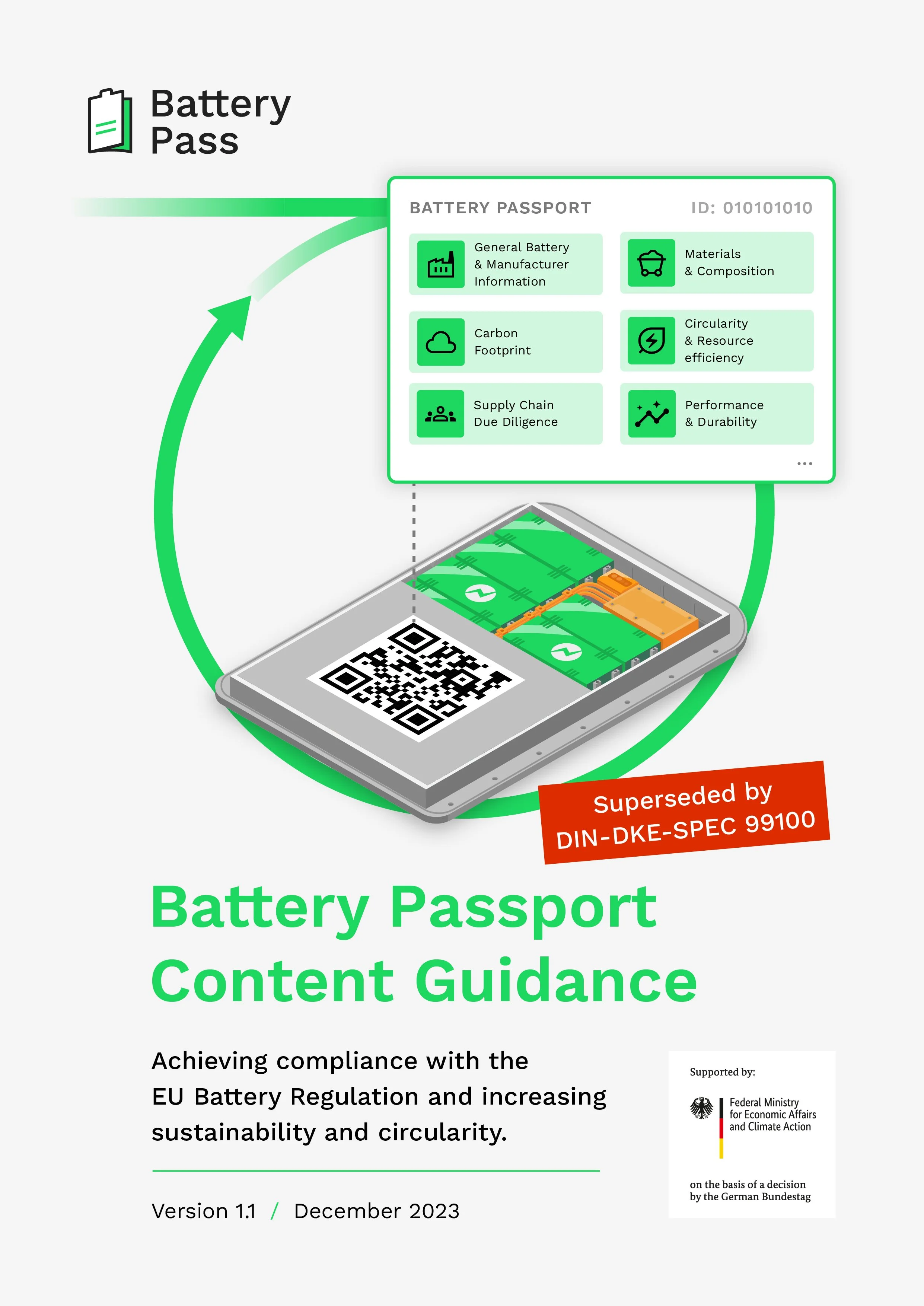Battery Passport Content Guidance / DIN DKE SPEC 99100
Achieving compliance with the EU Battery Regulation and increasing sustainability and circularity
Project: Battery Pass
Published: 8 December 2023 (Content Guidance) / January 2025 (DIN DKE SPEC 99100)
Author / Publisher: Battery Pass Consortium (Content Guidance) / DIN, DKE (DIN DKE SPEC 99100)
Batteries are key to a sustainable transition to low-carbon mobility and renewable energy. Circular and sustainable management of the large expected volumes of traction and stationary storage batteries can contribute significantly to achieving the Paris climate goals, decoupling resource use and prosperity, and securing resource sovereignty. Making the transition sustainable demands a systemic approach that enables responsible material sourcing, efficient production, as well as efficient and effective second-life and end-of-life applications and processes.
Comparing the sustainability and performance of batteries is not straightforward. This is set to change in February 2027 with the EU-wide mandatory digital battery passport, which will document data along a batter’s entire lifecycle. A new standard now provides practical guidance: The DIN DKE SPEC 99100, "Requirements for Data Attributes of the Battery Passport", helps companies implement the battery passport. Developed by the Battery Pass consortium in cooperation with public industry consultation, this builds on the Battery Pass Content Guidance, which was last updated in December 2023 and provided the first publicly available practical explanation of the content requirements of the battery passport as per the EU Battery Regulation.
DIN DKE SPEC 99100
DIN DKE SPEC 99100
The new standard, DIN DKE SPEC 99100, defines data attributes to be included in the digital battery passport based on both requirements by the EU Battery Regulation as well as voluntary additions. Published in January 2025, it was developed by the Battery Pass consortium in cooperation with public industry consultation and builds on the "Content Guidance for the EU Battery Passport“.
Data Attribute Longlist
Data Attribute Longlist
The data attribute longlist aligns with the DIN DKE SPEC 99100 standard published in January 2025 and includes all data attributes required (and suggested) for the EU battery passport alongside definitions and further relevant data dimensions. It can serve as a first basis for and facilitates the technical demonstration and implementation of the EU battery passport within the own organisation.
Main Content Guidance
Main Content Guidance
From January 2025, a new standard, DIN DKE SPEC 99100, defines the "Requirements for Data Attributes of the Battery Passport". Developed by the Battery Pass consortium in cooperation with public industry consultation, this builds on the Battery Pass Content Guidance, which was last updated in December 2023 and provided the first publicly available practical explanation of the content requirements of the battery passport as per the EU Battery Regulation.
Data Conformity Assessment
Data Conformity
This document provides a comprehensive overview of the principles and options for conformity assessment of battery passport data, emphasising the critical role of trustworthy data in supporting a circular economy. It expands beyond regulation, addressing specific challenges of the battery passport data and outlining practical recommendations.
Carbon footprint specific documents
Carbon Footprint Rules
This document provides accounting rules to calculate company-specific carbon footprints of the battery ‘Distribution‘ and ‘End-of-life‘ and rececyling`life cycle stages. The rules are proposed as a complementation to the GBA GHG Rulebook, thus providing a cradle-to-grave Battery Carbon Footprint Rulebook.
EOL Allocation Analysis
This insights report highlights the impact of the methodological choice on the carbon footprint declaration. It includes a comparative assesement of the three main end-of-life allocation approaches and their implication on the carbon footprint in the context of the EU Battery Regulation.









